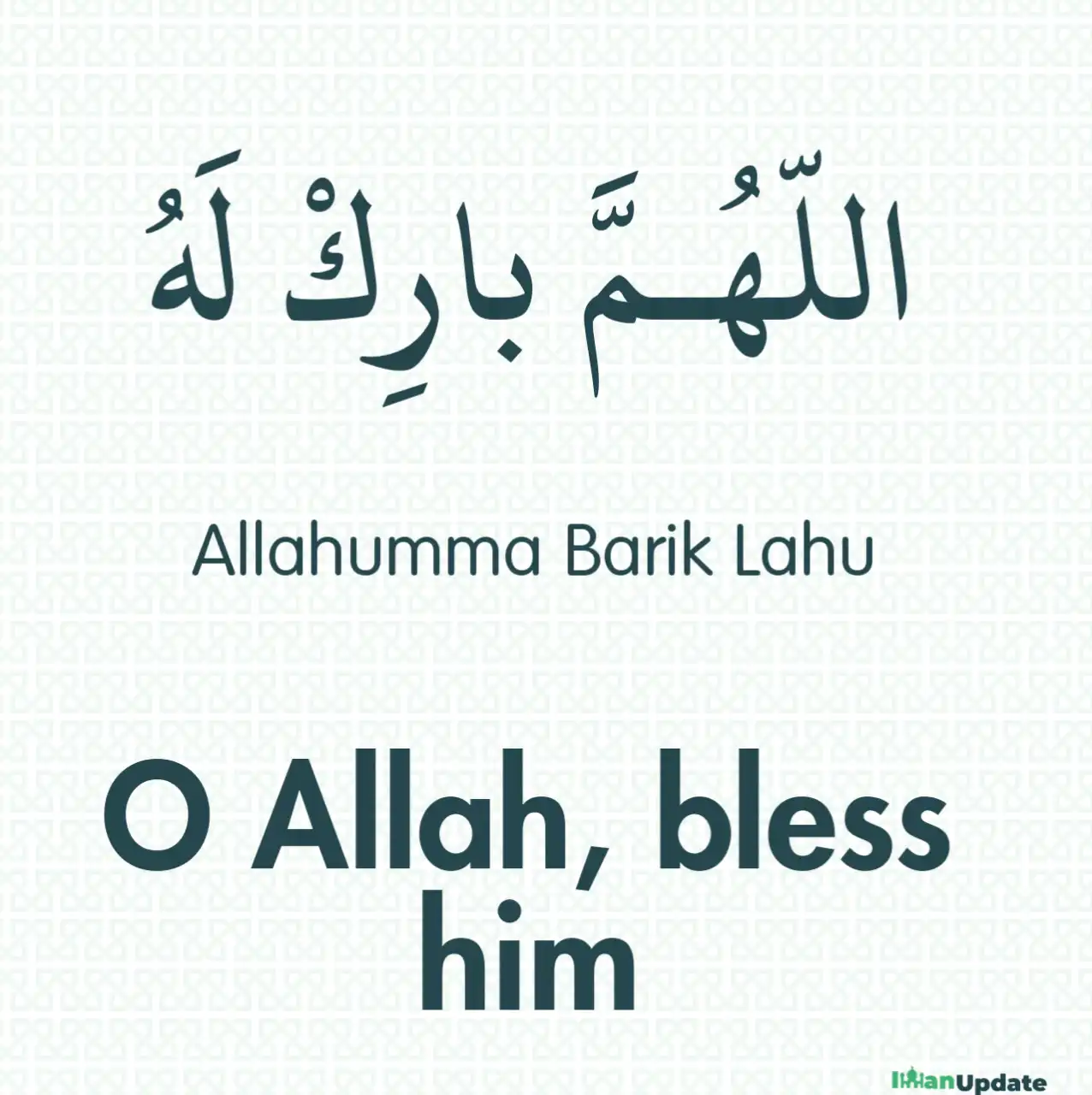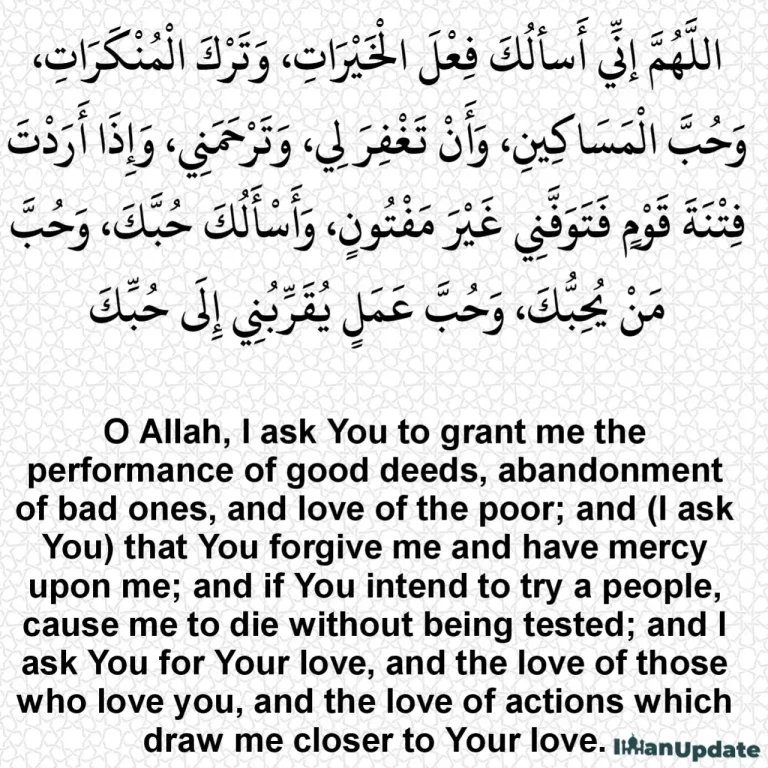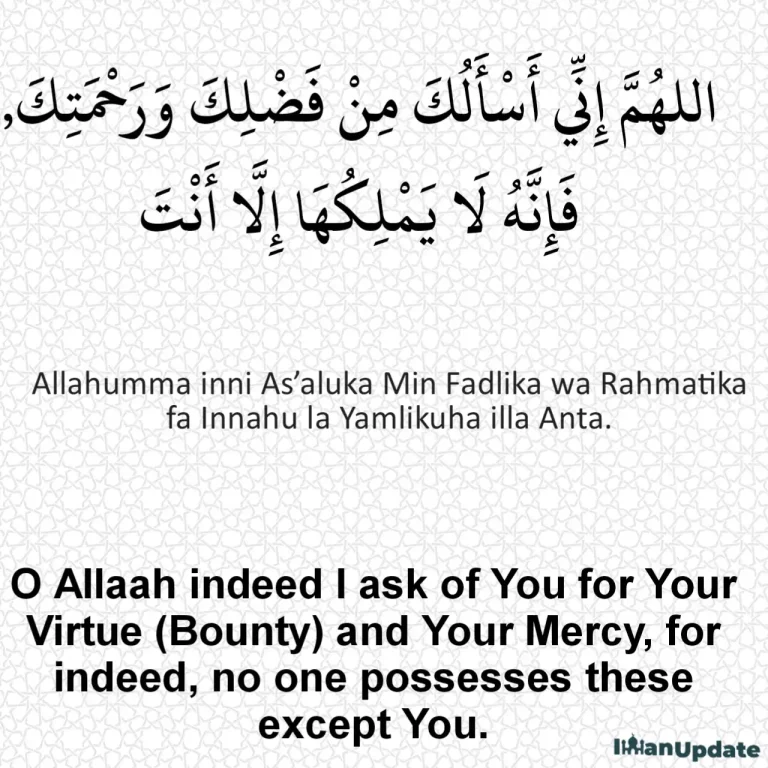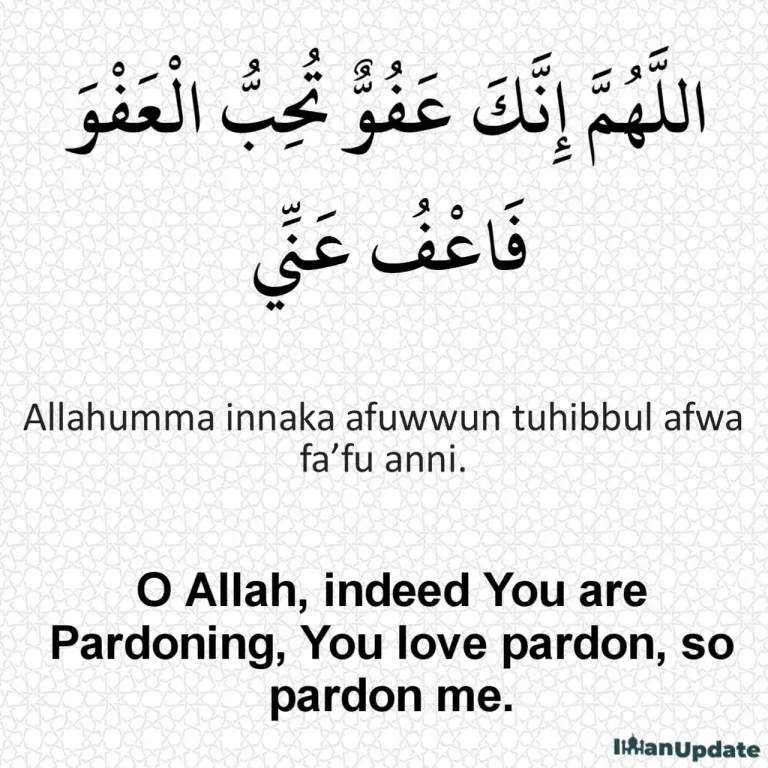Allahumma Barik Laha & Lahu Meaning, Arabic, and Reply
Advertisements
In Islam, there are numerous expressions that carry a deeper meaning beyond their literal translation. One such phrase is “Allahumma Barik,” which is commonly used in Muslim communities worldwide.
This expression is often used in various contexts, such as when someone acquires a new possession, when people get married, or when a newborn baby arrives in a family.
While many Muslims use this phrase, not everyone may fully understand its meaning and significance. Therefore, in this blog, we will be looking at Allahumma Barik meaning, along with its proper usage and the importance it holds in Islam.
Allahumma Barik in Arabic
In Arabic, Allahumma Barik is written as:
اللّهُـمَّ بارِكْ
Advertisements
Allahumma Barik Meaning in English
The phrase Allaahumma Barik (اللهم بارك) means “O Allah, bless” or “O Allah, shower Your blessings upon.” It is a heartfelt supplication, asking Allah to:
- Bestow His blessings and protection
- Show mercy and favor
- Grant abundance, success, and prosperity
- Envelop with His grace and kindness
Muslims commonly use Allaahumma Barik to express gratitude, seek blessings, and celebrate joyous occasions. Its meaning goes beyond a literal translation, serving as a way to connect with Allah and seek His favor in various aspects of life.
Allahumma Barik Laha in Arabic
اللّهُـمَّ بارِكْ لَها
Meaning of Allahumma Barik Laha
Allahumma barik laha is used for female and the meaning of the phrase is oh Allah, bless her.
Allahumma Barik Lahu in Arabic
اللّهُـمَّ بارِكْ لَهُ
Advertisements
Meaning of Allahumma Barik Lahu
Allahumma barik lahu is used for male and the meaning of the phrase is oh Allah, bless him.
Understanding “Allahumma Barik Laha” and “Allahumma Barik Lahu”
Allahumma Barik Laha (اللّهُـمَّ بارِكْ لَها)
Allahumma Barik Laha means, “O Allah, bless her,” and is specifically used to invoke blessings upon a female.
Allahumma Barik Lahu (اللّهُـمَّ بارِكْ لَهُ)
Allahumma Barik Lahu means, “O Allah, bless him,” used to invoke blessings for a male.
In addition to these singular forms, other variations exist for plural or mixed groups, such as:
| Gender/Group | Arabic Text | Transliteration | English Translation |
|---|---|---|---|
| Male (one) | اللّهُـمَّ بارِكْ لَهُ | Allahumma Barik Lahu | O Allah, bless him |
| Female (one) | اللّهُـمَّ بارِكْ لَها | Allahumma Barik Laha | O Allah, bless her |
| Male (plural) | اللّهُـمَّ بارِكْ لَهُم | Allahumma Barik Lahum | O Allah, bless them |
| Female (plural) | اللّهُـمَّ بارِكْ لَهُنَّ | Allahumma Barik Lahun | O Allah, bless them |
How To Reply To Allahumma Barik
If a person says ”Allahumma barik” the respond should be Ameen since it is Dua or Ameen Wa iyaak for male and Ameen Wa iyaaki’ for female.
You can say also say May Allah (SWT) bless you with the same (whatever they asked for you) and end it with ”Aameen”
Saying Ameen to dua is prescribed. The one who hears the du’aa’ and would like to be one of those who are included in it, should say Ameen.
By doing so he is asking his Lord to answer this du’aa’ and fulfil what is in it, for He is the best of those who are asked.
When someone says Allahumma Barik, you can respond with gratitude by saying:
- Ameen (آمين): Meaning “May it be so” or “Amen.”
- JazakAllah Khair (جزاك الله خير): Meaning “May Allah reward you with goodness.”
- Barakallah feek (بارك الله فيك): Meaning “May Allah bless you too.”
These responses acknowledge the supplication and reciprocate the blessings. You may also say Ameen wa iyaak for a male or Ameen wa iyaaki for a female, meaning “Ameen, and to you as well.” Saying Ameen to a du’a, as encouraged in the Sunnah, aligns with asking Allah to fulfill that prayer.
When to say Allahumma barik
The phrase Allahumma Barik is versatile and can be used in various situations, including:
- Celebrating joyous occasions:
- Weddings: “Allahumma Barik upon the newlyweds.”
- New births: “Allahumma Barik upon the newborn.”
- New possessions: “Allahumma Barik upon your new home/car.”
- Expressing gratitude:
- “Allahumma Barik for this blessing.”
- Seeking blessings:
- “Allahumma Barik upon our gathering.”
- “Allahumma Barik upon our meal.”
- Showing appreciation:
- “Allahumma Barik for your support.”
- Asking for protection:
- “Allahumma Barik upon us and our families.”
The Prophet (blessings and peace of Allah be upon him) instructed the Muslim, if he sees something with his Muslim brothers that he admires, to pray for blessing (barakah) for them. The Prophet (blessings and peace of Allah be upon him) said:
“If one of you sees something with his brother that he admires, let him pray for blessing (barakah) for him.”
Narrated by Imam Malik in al-Muwatta (2/939), Imam Ahmad in al-Musnad (25/355), and Ibn Majah (3509)
Ibn al-Qayyim (may Allah have mercy on him) said:
“If the one who is looking fears that he could cause harm by his evil eye to the object that he is looking at, then he may ward off its evil by saying “Allahumma barik ‘alayhi (O Allah, bless it for him),”
as the Prophet (blessings and peace of Allah be upon him) said to ‘Amir ibn Rabi‘ah, when he looked at Sahl ibn Hunayf:
“Did you not pray for barakah for him?” – In other words did you not say “Allahumma barik ‘alayhi (O Allah, bless it for him)”?”
Zad al-Ma‘ad, 4/156
Ibn ‘Abd al-Barr (may Allah be pleased with him) stated that this is obligatory, when he said:
“The words of the Messenger of Allah (blessings and peace of Allah be upon him), “Did you not pray for barakah for him?”, indicate that the evil eye does not cause any harm if the one who looks at a thing prays for barakah for it; it can only cause harm if he does not offer supplication.
So what is required of everyone who admires a thing is to pray for barakah for it. If he prays for barakah, that will inevitably ward off what is feared of harm.
And Allah knows best.”
At-Tamhid, 6/240-241
Al-Manaawi said in his book Faydh Al-Qadeer:
“The term, ‘let him supplicate for blessing’, suggests the recommendation of saying, ‘O Allah, bless him and do not cause harm to him (Allaahumma Baarik Lahu wa la Tadhurruh),’
and also, ‘That which Allah wills (happens), there is no might except with Allah (Ma Shaa’ Allah, La Quwwata Illa Billaah)!'”
Allahumma Barik or Mashallah
While both phrases express positivity, Allahumma Barik and Masha Allah serve different purposes:
- Allahumma Barik (اللهم بارك): This phrase is a supplication, asking Allah to bestow blessings and grace upon a person or object. For instance, upon acquiring a new possession, you might say, “Allahumma Barik for this car.”
- Masha Allah (ما شاء الله): This phrase translates to “What Allah has willed” and is used to express admiration or appreciation, acknowledging that all good things come by Allah’s will. For example, upon seeing a beautiful view, you might say, “Masha Allah, this scenery is stunning.”
Summary: Allahumma Barik is a request for blessings, while Masha Allah is an expression of admiration.
According to scholars, it is permissible to supplicate, as a protection against evil eyes, by asking blessings or saying Ma Shaa’ Allah; both are permissible.
Hadith On Allah Humma Barik
There are hadiths which mentions this phrase.
1. Hadith
It was narrated from Aqil bin Abu Talib: that he married a woman from Banu Jusham, and they said: “May you live in harmony and have many sons.” He said:
“Do not say that, rather say what the Messenger of Allah said: ‘Allahumma barik lahum wa barikalaihim (O Allah, bless them and bestow blessings upon them).’
Sunan Ibn Majah 1906
Allahumma barik lahum wa barik alaihim in Arabic
Here is how to write this Dua in Arabic:
اللَّهُمَّ بَارِكْ لَهُمْ وَبَارِكْ عَلَيْهِمْ
Meaning: O Allah, bless them and bestow blessings upon them.
2. Hadith
Narrated Abdullah ibn Abbas: I was in the house of Maymunah. The Messenger of Allah (ﷺ) accompanied by Khalid ibn al-Walid entered.
Two roasted long-tailed lizards (dabb) placed on the sticks were brought to him. The Messenger of Allah (ﷺ) spat.
Khalid said: I think that you abominate it, Messenger of Allah. He said: Yes. Then the Messenger of Allah (ﷺ) was brought milk, and he drank (it).
The Messenger of Allah (ﷺ) then said: When one of you eats food, he should say: O Allah, bless us in it, and give us food (or nourishment) better than it. When he is given milk to drink he should say: O Allah! bless us in it and give us more of it, for no food or drink satisfies like milk.
Sunan Abi Dawud 3730
اللَّهُمَّ بَارِكْ لَنَا فِيهِ وَأَطْعِمْنَا خَيْرًا مِنْهُ
Meaning: O Allah, bless us in it, and give us food (or nourishment) better than it.
اللَّهُمَّ بَارِكْ لَنَا فِيهِ وَزِدْنَا مِنْهُ
Meaning: O Allah! bless us in it and give us more of it.
Conclusion
Allahumma Barik meaning is a beautiful phrase that carries a deep spiritual meaning in Islam. By asking Allah to bless something or someone, Muslims acknowledge that blessings come from Allah and that they must use them wisely and share them with others.
Advertisements








4 Comments